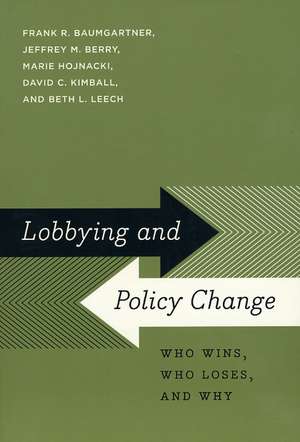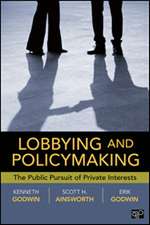Lobbying and Policy Change: Who Wins, Who Loses, and Why
Autor Frank R. Baumgartner, Jeffrey M. Berry, Marie Hojnacki, David C. Kimball, Beth L. Leechen Limba Engleză Paperback – 15 iul 2009
During the 2008 election season, politicians from both sides of the aisle promised to rid government of lobbyists’ undue influence. For the authors of Lobbying and Policy Change, the most extensive study ever done on the topic, these promises ring hollow—not because politicians fail to keep them but because lobbies are far less influential than political rhetoric suggests.
Based on a comprehensive examination of ninety-eight issues, this volume demonstrates that sixty percent of recent lobbying campaigns failed to change policy despite millions of dollars spent trying. Why? The authors find that resources explain less than five percent of the difference between successful and unsuccessful efforts. Moreover, they show, these attempts must overcome an entrenched Washington system with a tremendous bias in favor of the status quo.
Though elected officials and existing policies carry more weight, lobbies have an impact too, and when advocates for a given issue finally succeed, policy tends to change significantly. The authors argue, however, that the lobbying community so strongly reflects elite interests that it will not fundamentally alter the balance of power unless its makeup shifts dramatically in favor of average Americans’ concerns.
Based on a comprehensive examination of ninety-eight issues, this volume demonstrates that sixty percent of recent lobbying campaigns failed to change policy despite millions of dollars spent trying. Why? The authors find that resources explain less than five percent of the difference between successful and unsuccessful efforts. Moreover, they show, these attempts must overcome an entrenched Washington system with a tremendous bias in favor of the status quo.
Though elected officials and existing policies carry more weight, lobbies have an impact too, and when advocates for a given issue finally succeed, policy tends to change significantly. The authors argue, however, that the lobbying community so strongly reflects elite interests that it will not fundamentally alter the balance of power unless its makeup shifts dramatically in favor of average Americans’ concerns.
Preț: 244.72 lei
Nou
Puncte Express: 367
Preț estimativ în valută:
46.83€ • 49.02$ • 38.98£
46.83€ • 49.02$ • 38.98£
Carte tipărită la comandă
Livrare economică 31 martie-14 aprilie
Preluare comenzi: 021 569.72.76
Specificații
ISBN-13: 9780226039459
ISBN-10: 0226039455
Pagini: 360
Ilustrații: 10 line drawings, 40 tables
Dimensiuni: 152 x 229 x 23 mm
Greutate: 0.48 kg
Editura: University of Chicago Press
Colecția University of Chicago Press
ISBN-10: 0226039455
Pagini: 360
Ilustrații: 10 line drawings, 40 tables
Dimensiuni: 152 x 229 x 23 mm
Greutate: 0.48 kg
Editura: University of Chicago Press
Colecția University of Chicago Press
Notă biografică
Frank R. Baumgartner is the Bruce R. Miller and Dean D. LaVigne Professor of Political Science at Penn State University. Jeffrey M. Berry is the John Richard Skuse Professor of Political Science at Tufts University. Marie Hojnacki is associate professor of political science at Penn State University. David C. Kimball is associate professor of political science at the University of Missouri–St. Louis. Beth L. Leech is associate professor of political science at Rutgers University.
Cuprins
List of Tables and Figures
Acknowledgments
Chapter 1. Advocacy, Public Policy, and Policy Change
Chapter 2. Incrementalism and the Status Quo
Chapter 3. Structure or Chaos?
Chapter 4. Opposition and Obstacles
Chapter 5. Partisanship and Elections
Chapter 6. Strategic Choices
Chapter 7. Arguments
Chapter 8. Tactics
Chapter 9. Washington: The Real No-Spin Zone
Chapter 10. Does Money Buy Public Policy?
Chapter 11. Policy Outcomes
Chapter 12. Rethinking Policy Change
Methodological Appendix
Notes
Index
Acknowledgments
Chapter 1. Advocacy, Public Policy, and Policy Change
Chapter 2. Incrementalism and the Status Quo
Chapter 3. Structure or Chaos?
Chapter 4. Opposition and Obstacles
Chapter 5. Partisanship and Elections
Chapter 6. Strategic Choices
Chapter 7. Arguments
Chapter 8. Tactics
Chapter 9. Washington: The Real No-Spin Zone
Chapter 10. Does Money Buy Public Policy?
Chapter 11. Policy Outcomes
Chapter 12. Rethinking Policy Change
Methodological Appendix
Notes
Index











